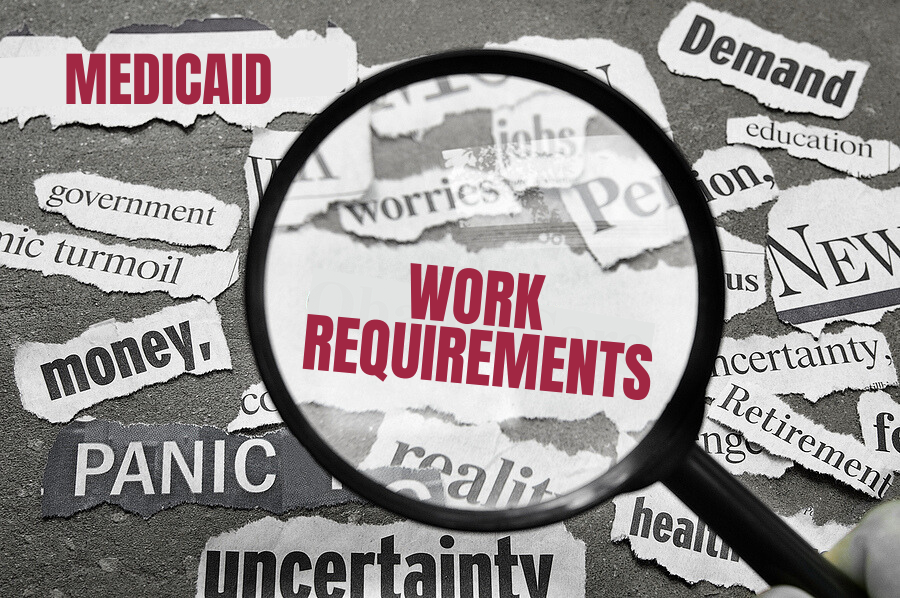The new budget reconciliation law (aka OBBB — the One Big Beautiful Bill) makes the largest Medicaid cut in history ($990 billion over ten years). It will likely take health insurance away from about 10 million people, and another 5 million will likely lose coverage because of other Congressional Marketplace policies. It will wreak utter havoc on state budgets and health systems for years and decades to come. Our explainer of the new law is available here.
Undoubtedly one of the worst things the law does – and that is a high bar – is to mandate a Medicaid work requirement for Medicaid expansion or expansion-related enrollees in all states that have expanded Medicaid, starting on January 1, 2027. The work requirements do not apply to other Medicaid populations (such as section 1931 parents or other traditional groups), and thus do not apply in states that haven’t expanded Medicaid coverage thus far, including Alabama, Florida, Kansas, Mississippi, South Carolina, Tennessee, Texas, and Wyoming1. We’ve explained many times why these work requirements have nothing to do with work, only result in people losing their health insurance, and disproportionately hurt workers and people with disabilities. This proposal alone will result in some 6 million people losing health insurance.
However, there is one immediate and important side-effect of the drafting of this federal work requirement to understand. The law allows states to start a work requirement prior to 2027 if they so choose, but any such work requirement must operate “subject to the…provisions of” the new work requirement law.
This is significant because it means that in the small set of states that currently have a work requirement under construction through a section 1115 demonstration waiver, the states will need to redesign their 1115 proposals to meet the minimum requirements of the new federal law. The Centers for Medicaid Services (CMS) will not be able to approve work requirement 1115 waivers that do not comply with the minimum OBBB requirements. For example, a state that doesn’t have exemptions in place for parents with children up to age 13, would need to add that exemption, since it is required under the new law. This also means that Georgia, which has a problematic and costly work requirement in place, will need to modify its current program to come into compliance. (Georgia is already in the process of amending its work requirement, so the state could and should use that amendment process to make the necessary changes.) Note that as a matter of proper process, all states (including Georgia) should redesign their proposals, re-post them for state public comment, and then resubmit the proposals to CMS for review including federal public comment.
At this point, however, it makes little sense for a state to proceed with a work requirement waiver at all, since it doesn’t need to use a waiver to do the work requirement, it must comply with the statutory requirements in any case, and one of the provisions of the law clearly prohibits work requirement waivers starting 2027 (if not earlier). Why go through the process to get a waiver when you don’t need it and it will be expiring in less than 1.5 years?
Medicaid work reporting requirement waivers were a central feature of President Trump’s first term, but the landscape is fundamentally different now.
Notes:
Two key citations to the law discussed above are provided below. Section 71119 of the new law adds a new section to the Medicaid Act at Section 1902(xx).
1902(xx)(1) (emphasis added)
“(1) IN GENERAL.—Except as provided in paragraph (11), beginning not later than the first day of the first quarter that begins after December 31, 2026, or, at the option of the State under a waiver or demonstration project under section specify, subject to the succeeding provisions of this subsection, a State shall provide, as a condition of eligibility for medical assistance for an applicable individual, that such individual is required to demonstrate community engagement…”
1902(xx)(10) (emphasis added)
‘‘(10) PROHIBITING WAIVER OF COMMUNITY ENGAGEMENT REQUIREMENTS. Notwithstanding section 1115(a), the provisions of this subsection may not be waived.”
- Wisconsin and Georgia are subject to the provisions of the law because they are covering an expansion like population through a Section 1115 demonstration. ↩︎


